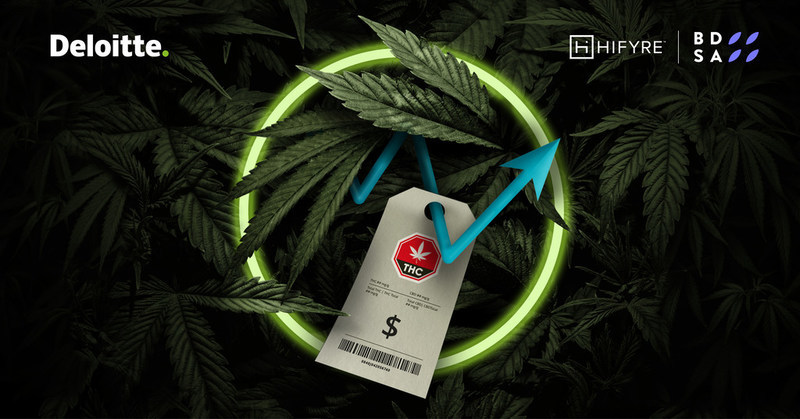Through a strategic collaboration, BDSA, Deloitte Canada, and Hifyre Inc., the technology subsidiary of Fire & Flower Holdings Corp., revealed a new, in-depth cannabis pricing report entitled, “Price. It’s Complicated. How Cannabis Pricing Differs From Other Consumer Goods“.
Over the last several years, the medical and adult-use cannabis markets have seen rapid expansion across North America. The latest report from BDSA, Deloitte Canada and Hifyre™, unveils new consumer survey data alongside proprietary market and sales data, providing insights into the pricing dynamics of legal cannabis markets in both Canada and the United States and an understanding of the similarities and differences observed across the growing cannabis industry as compared to traditional CPG markets.
“Legal cannabis sales in Canada and the U.S. are growing rapidly and in speaking with our customers and examining the data, pricing is consistently indicated as a primary factor in purchasing decisions,” said Matthew Hollingshead, President of Hifyre and Chief Innovation Officer at Fire & Flower. “As existing markets mature and new markets come online, cannabis pricing is expected to remain extremely volatile, though there are some similarities in trends to traditional CPG markets like consumers willing to pay a premium price for superior products or services.”
“As the market continues to expand, understanding the role of pricing will be imperative to maximizing potential for brands and retailers,” said Kelly Nielsen, Vice President of Insights and Analytics at BDSA. “Market growth brings opportunity, and we continue to see more brands and products entering the market. At the same time, though, consumers, manufacturers, and retailers are getting more sophisticated. In order to be competitive, it is important to understand how pricing plays a role in the decision-making process, and how pricing and product benefits can be leveraged to maximize potential.”
“Pricing in the cannabis market is complex and dynamic, and is expected to remain so,” said Sid Hathiramani, Partner, Risk Advisory at Deloitte Canada. “Business leaders must be careful when making assumptions based on other consumer industries, and instead analyze the data closely, stay informed on market and competitive activity, and contain costs in order to achieve target profits. Strong, data-driven business practices will set cannabis companies up for success.”
Additional findings from the report include:
Cannabis Markets Keep Growing Up
Global legal cannabis sales reached nearly US$21.6 billion in 2020, an increase of 50% over 2019 sales of US$14.4 billion, due largely to legalization. BDSA forecasts global cannabis sales will continue to grow quickly, to US$62.1 billion in 2026, more than double the 2021 estimated global sales of US$30.6 billion, at a compound annual growth rate (CAGR) of more than 15%.
Through dispensaries alone, cannabis sales in the United States reached US$18.0 billion in 2020, and are forecasted to reach US$24.9 billion in 2021. BDSA expects U.S. sales to reach US$47.6 billion in 2026, the result of a CAGR of 13.8%, with growth coming from both the opening of new markets and the expansion of existing ones.
Price Matters
In both the United States and Canada, consumers consistently indicate price is a key factor in decisions about what cannabis product to buy. The most recent BDSA Consumer Insights survey, which polls thousands of consumers every six months, found that in states where cannabis is legal for adult and medical use, low price was consistently identified in the top three drivers of product choice. More than a quarter (27%) of respondents said price influences their purchase decision, just behind taste/flavour and high THC content. In Canada, low price was the leading influencer of product choice, with 34% of consumers stating it matters the most.
In Deloitte Canada’s latest study of Canadian cannabis consumers, titled ‘Seeding new opportunities: Listening to Canada’s cannabis consumer‘, 70% of respondents who shop the illicit market stated that better or lower pricing was a key reason they turned to that market.
Consumers Will Pay More for Worthy Products
Discerning consumers will pay a premium for superior products and/or benefits. For example, live resin sales in the 1,000-mg vape category in California demonstrate that consumers will pay for premium products. Live resin is generally perceived as having a higher quality than other vape cartridge-extraction methods, and now represents 33% of total vape sales in the state, up from 8% in 2019.
There’s similar evidence that consumers of edibles are willing to pay a premium for unique additional ingredients in gummies. In the California market, for example, gummies that also contain CBD are, on average, priced 18% higher—and their sales have increased by 41% from the second quarter of 2020 to the second quarter of 2021. In Canada, meanwhile, craft dried flower commands a price premium ranging from 16% to 41%, depending on its THC level.
Brands Don’t Yet Command Premium Pricing
In the US market, consumers do not name “reputation of a brand” as a top-10 influencer of their purchasing decision. Only 18% of those surveyed say brand reputation influences their product choice. Survey data found that consumers are more likely to choose a product that is either a brand they have used before (25%); would opt for a brand that has been recommended by a friend or family member (20%); or opt for a brand recommended by a “budtender” or “cannista” (21%).
The Laws of Economics Are Still the Laws of Economics
The cost of goods is a key driver of wholesale pricing and differs significantly by market. For example, in August 2021, the average price per pound of flower in Oregon was $1,600/lb but only $900/lb in Colorado. A range of factors influence the cost of goods, including the grow environment, cultivars, yield, facility scale, grow medium, and trim method. Supply and demand, as ever, are also fundamentals. In Arizona, where sales for adult-use cannabis began in January 2021, shortly after it was legalized, prices in the long-legal medical cannabis channel increased in response to the increased overall demand.
Product supply was low when adult-use cannabis was legally made available in Canada, which resulted in relatively high pricing at the start. As supply increased, the price decreased, with the average price per gram of dried flower falling from $11.78/gm in the first half of 2019 (shortly after legal sales began) to $7.50/gm in the same period in 2021.
If you are interested in reviewing the full report, you may download it here.
About Fire & Flower
Fire & Flower is a leading, technology-powered, adult-use cannabis retailer with more than 95 corporate-owned stores in its network. The Company leverages its wholly-owned technology development subsidiary, Hifyre Inc., to continually advance its proprietary retail operations model while also providing additional independent high-margin revenue streams. Fire & Flower guides consumers through the complex world of cannabis through education-focused, best-in-class retailing while the HifyreTM digital and analytics platform empowers retailers to optimize their connections with consumers. The Company’s leadership team combines extensive experience in the technology, cannabis and retail industries. To learn more about Fire & Flower, visit https://fireandflower.com.
About Hifyre
The Hifyre Digital Retail and Analytics Platform is a proprietary ecosystem of products that includes the Spark Perks member program, Hifyre ONE retail software platform and the Hifyre IQ cannabis data and analytics platform. The Hifyre platform also supports Fire & Flower’s advanced operations and provides a competitive advantage in providing a tailored digital experience and understanding consumer behaviours in the evolving cannabis market. To learn more about Hifyre, visit www.hifyre.com.
About BDSA
Headquartered in Boulder, Colorado, BDSA is the premier global cannabis market research firm helping businesses improve revenues, reduce innovation risk, and prioritize market expansion. The company provides a holistic understanding of the cannabis market through data, analytics, and insights from retail sales data, consumer research, and market forecasts. To learn more please visit https://bdsa.com/.
About Deloitte
Deloitte provides audit and assurance, consulting, financial advisory, risk advisory, tax, and related services to public and private clients spanning multiple industries. Deloitte serves four out of five Fortune Global 500® companies through a globally connected network of member firms in more than 150 countries and territories bringing world class capabilities, insights, and service to address clients’ most complex business challenges. Deloitte LLP, an Ontario limited liability partnership, is the Canadian member firm of Deloitte Touche Tohmatsu Limited. Please see https://www.deloitte.com/about for a detailed description of the legal structure of Deloitte Touche Tohmatsu Limited and its member firms.


